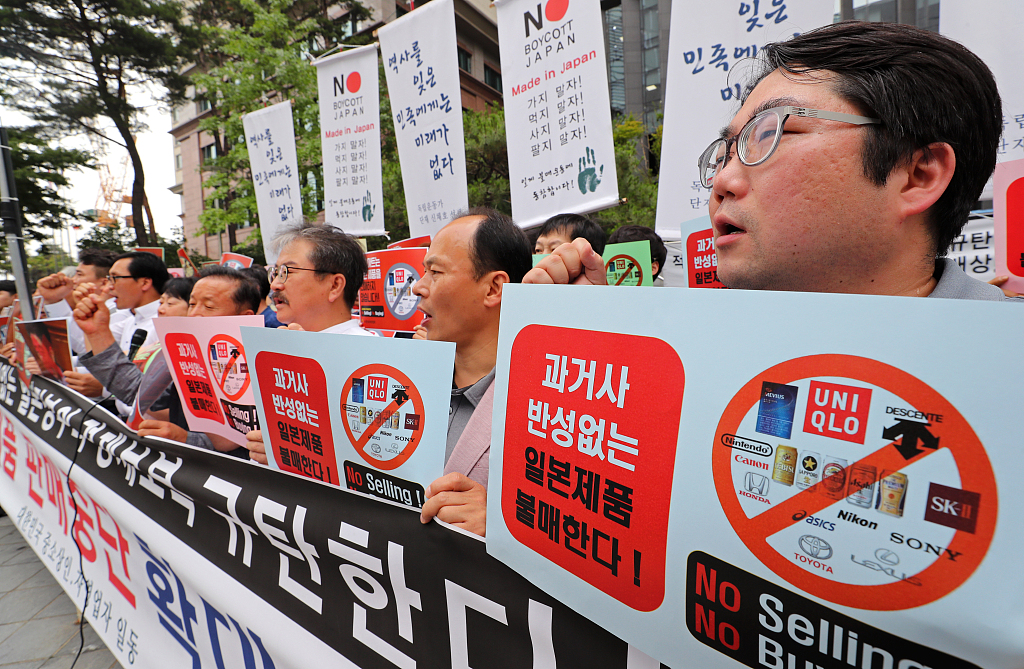Japan has restricted the exports of the three products to the Republic of Korea (ROK) mainly to vent its anger against the ROK Supreme Court's ruling last year that Japanese companies must compensate Koreans forced to work in mines and factories and as "comfort women" before and during World War II, ROK President Moon Jae-in's hard-line policy toward Tokyo, and the two countries' conflicting policies on the Korean Peninsula nuclear issue.

Protester holds up signs in the the Republic of Korea, July 15, 2019. (File photo: VCG)
Besides, Japanese Prime Minister Shinzo Abe wants to portray himself as a strong leader who brooks no nonsense so his ruling Liberal Democratic Party, along with its coalition partner Komeito, can win two-thirds of the seats in the upper house election on Sunday. To some extent, Japan also intends to show the United States that it will respond aggressively to any moves it considers harmful to the country, so that the US stops coercing Japan to compromise its economic interests.
Yet in so doing Tokyo has adopted the US' unilateral strategy of using economic sanctions to resolve non-economic issues. This will harm the ROK as Japan expects, but it will also deal a blow to the regional economy and stability by hindering the progress of the China-Japan-ROK free trade agreement, especially because Seoul is mulling taking countermeasures against Tokyo, which could worsen the situation, and the US is not expected to sincerely mediate between its two allies.
Zhou Yongsheng, a professor at and deputy director of Japanese Studies Center, China Foreign Affairs University
Tokyo and Seoul not likely to engage in security conflict
The trade spat between the two neighbors has its roots in a series of events including the 2018 radar lock-on dispute, the closing of Japan-funded "comfort women" foundation and the controversy over some ROK officials demanding the Japanese emperor's apology for Japan's war crimes. And the Abe administration's displeasure with Seoul's policies under President Moon Jae-in, as reflected in Moon's engagement with the Democratic People's Republic of Korea, has boiled over.
But Tokyo's move to wield the high-tech stick could draw the two countries into a vicious circle of attack and retaliation, in particular, because Seoul could respond in kind to what Moon said was an unprecedented emergency. In fact, anti-Japan sentiments are raging through the ROK with some shops ceasing to sell Japanese products.
The latest Tokyo-Seoul conflict has not only created new problems for bilateral ties but also threatens to weaken the economic and political fabric of East Asia, which would be detrimental to the further integration of the regional economies, and make it more difficult for the world to maintain economic stability and prosperity in the face of increasing trade disputes.
The deteriorating relations between Tokyo and Seoul have caused much worry among US elites, too, because the US' alliance with the two countries has helped Washington to consolidate its strategic foothold in the Asia-Pacific region while Japan's actions against the ROK could push the latter closer to China on economic and strategic issues. But despite the souring of relations, Japan and the ROK are not likely to engage in a security conflict, because the ROK remains highly dependent on the US when it comes to security.


